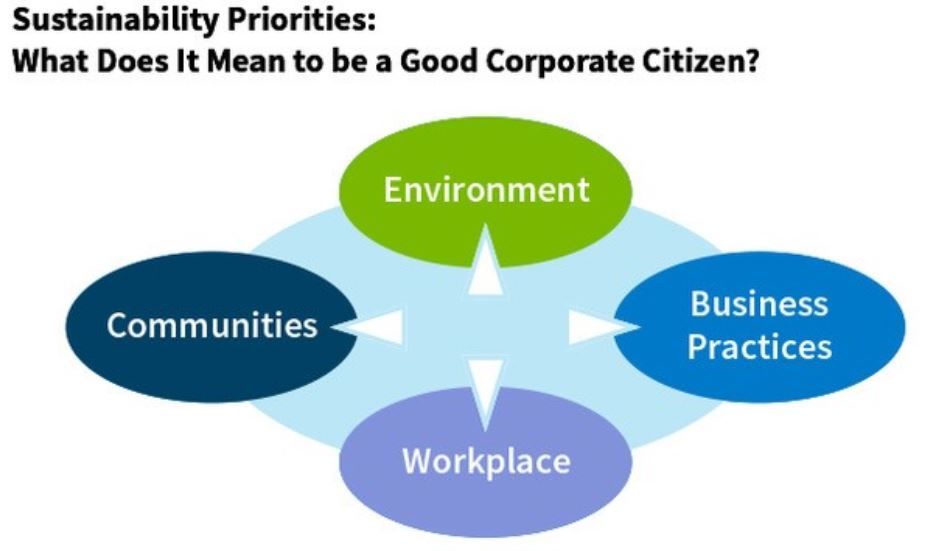
Across industries, companies are asking themselves: Are we a good corporate citizen?
At William Blair, we believe that there is no one way to answer this important question. Rather, we believe that corporate social responsibility (CSR) and the application of environmental, social, and governance (ESG) factors will vary based on a company's business model and industry.
Still, we find it useful to group sustainability priorities into four main quadrants: environment, business practices, communities, and workplace. While these quadrants can be interpreted differently, they provide a useful construct for answering the question, What does it mean to be a good corporate citizen?
Treating the Environment Responsibly
Environmental responsibility can mean very different things to different businesses, and it's largely a function of each company's industry and business model.
For manufacturing companies, this often means using water, fossil fuels, and other resources as efficiently as possible across the supply chain. But for a company that doesn't manufacture or distribute anything, reducing its carbon footprint may mean upgrading to more energy-efficient HVAC systems in its office or eliminating paper documents. Yet another company might focus its environmental responsibility efforts around protecting against and responding to natural disasters.
Regardless of how it manifests itself, a common thread is that environmental responsibility can have a significant impact on financial performance.
One company discovered waste around its distribution centers and initially approached the issue purely from the perspective of using resources more responsibly to reduce the company's environmental impact. After a deep continuous improvement analysis, however, the company realized that it was just as much a financial issue as an environmental one. The analysis found that the waste in the distribution center was costing the company millions in product losses.
Fostering Responsible and Ethical Business Practices Through Governance
This is a broad quadrant that encompasses governance, workplace respect, accountability, business continuity, and other business practices. This topic, like the others, is about more than simply “doing the right thing” for ethical reasons. Proper governance plays a leading role in managing risk across the organization.
For an organization to be truly sustainable, it needs to identify, mitigate, and respond to risks that are constantly arising both inside and outside the organization. This starts at the board level through corporate governance, but this mindset of conducting the business in an ethical, responsible way and thinking about ways to ensure the company's long-term viability needs to be pervasive across an organization.
Investing in Communities
Making a positive community impact is more about “investing in” the communities one serves rather than “giving back” to them. And strategic investments in the community can take many different forms, including philanthropy, volunteerism, and impact investing.
An integrated approach to investing in communities is important. To truly maximize impact, a company must look for opportunities in which its financial contributions—together with contributions employees make in terms of their time, talent, and financial resources—are fully aligned to address the most pressing needs.
Making an impact also means investing your social capital wisely. We define this as “doing good with what you're good at doing.” In addition to shaping how a company runs its business, it can also impact supply chain management.
Digging deep into the supply chain may reveal many smaller businesses that are operating without a code of ethics or human rights principles—in which case a company must think critically about whether it wants to continue doing business with the entity given the potential reputational risks involved.
Building a Healthy and Diverse Workplace
Employees today want to work for businesses that foster a culture of inclusion and diversity, provide comprehensive benefits that help employees lead happier, healthier lives, and communicate the company's vision and strategy to all levels of the organization.
This is true across all age groups, but especially for younger generations. Some 88% of millennials say their job is more fulfilling when they have an opportunity to make a positive impact, and 64% won't take a job if a potential employer doesn't have strong corporate social responsibility (CSR) practices, according to the Cone Communications Millennial Employee Engagement Study.
These mindsets don't just shape a company's culture; they can make a difference to the bottom line. Employee turnover can be a major drag on efficiency and profitability, and in an increasingly tight labor market, companies need to inspire employees to contribute to the company's larger mission. This is especially true for a professional services firm, such as William Blair, where our people—and their intellects and passion—truly are our most valuable assets.
Overcoming Challenges
Ultimately, companies need to determine what CSR means to them and focus on issues that are material to their business. They must also realize that being a good corporate citizen isn't a destination; it's a journey.
One of the biggest challenges involves managing the needs of various stakeholders—clients, employees, and investors. Often, each of the quadrants means something different to each group, creating a difficult balancing act.
Along with the priorities of the various stakeholder groups and the broader business environment in which the company operates, the types of decisions facing companies are constantly evolving. It is important to stay abreast of these developments.
Laura Coy
Director of Community Engagement
William Blair Investment Management
Tipp: Dieser Beitrag ist auch im "Investment Insights"-Blog von William Blair verfügbar.
William Blair Updates per E-Mail erhalten



